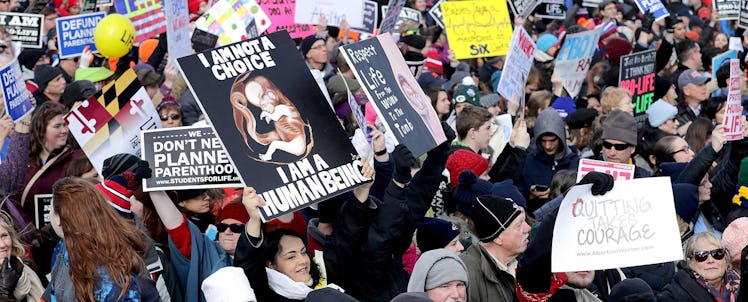If Pro-Lifers Want To Stop Abortions, They Should Be Pro-Parent
As fetal heartbeat abortion bans advanced in red states, it’s clear pro-life activists misunderstand the dilemma faced by would-be parents.

Georgia Governor Brian Kemp is expected to sign a bill this week that bans most abortions after the detection of a fetal heartbeat. The governor’s signature will make Georgia the third state, joining Kentucky and Mississippi, to adopt an abortion ban connected with fetal heartbeats, which can be detected as early as six weeks. But while heartbeat bills are increasingly popular in red states, they aren’t particularly helpful to the pro-life cause. Most bans don’t survive the courts and making abortion harder to access has historically increased demand for abortion services. This means a ton of political energy is being expended on rhetorical gestures instead of on policies that could actually reduce abortion rates in the United States, which most pro-choice activists would likely agree is a noble goal. But what policies would make a difference? Pro-parent policies would be the best place to start.
Many women and couples who decide to terminate a pregnancy do so because they feel unprepared for the cost of raising children. In a 2013 study published in the journal BMC Women’s Health, researchers found that 40 percent of American women cite socioeconomic concerns as the primary reason for seeking an abortion. From an economic standpoint, that makes a tremendous amount of sense. Raising a child has become increasingly expensive. “Normal Birth” costs $3,400 on average for women with private insurance. After the birth, raising a child to the age of 18 costs an estimated $233,610 according to the USDA. About 16-percent of that cost is linked to childcare, which can rival college tuition at $15,000 per year. And about 6 percent of the cost is related to healthcare expenses.
The USDA figure is probably low. If parents want their child to succeed in an increasingly unequal economy, they will need to sink a huge amount of time and money into additional training and education. That’s because, increasingly, the only path to the middle and upper-middle classes runs through college. Access to higher education is becoming increasingly competitive and expensive (see: the college admissions scam scandal).
The costs associated with transportation, housing, food, and clothing are not going down.
Additionally, American parents are only guaranteed 12 weeks of unpaid leave to spend with their baby, and only 14 percent of US companies offer employees any kind of paid leave to make those crucial first weeks affordable. This means that the first weeks of parenthood are bound to be incredibly difficult if not economically untenable for the 80 percent of Americans living paycheck to paycheck.
When women and their partners face an unwanted pregnancy, this all weighs heavily. And it’s incredibly difficult to choose to carry a pregnancy to term when parenting is such a costly and lonely experience. Think that partners facing this decision aren’t aware of all this? Recall that 59 percent of women getting abortions are already mothers.
Pro-life activists seem to miss the crucial point that abortions are likely to remain common, though in a historically slow decline, until the decision to end a pregnancy isn’t economically responsible for those who are already parents or would genuinely like to be. Women and couples who knew they would be supported with affordable healthcare, ample paid parental leave, free childcare and better education for their kid would be much more likely to want to have, and raise a child.
That’s not supposition. The countries with the lowest abortion rates tend to be those that offer robust social supports for parents and families (not the ones that ban abortions). The Netherlands, for instance, has the lowest abortion rate in the world with only 5 to 7 abortions per 1,000 women, compared to 17 per 1000 in the United States. While easy access to contraception and sex education has a good deal to do with the low abortion rate, family policy in the Netherlands also makes it much easier to raise a child.
Dutch families are given a monthly allowance equivalent to $260 for every dependent child. Dutch healthcare is mandatory and highly subsidized making it very inexpensive for consumers. Dutch parents also enjoy subsidized childcare, and universal preschool education starting at age four. Schools are also mandated to offer after-school care for those children that need it.
What anti-abortion activists fail to understand is that they could move America towards fewer abortions by being pro-parent as well as anti-abortion (and understanding that these are the same thing). If they put their tremendous energy and lobbying power towards supporting policies and politicians that help parents raise kids, they could be moral, religious individuals while also improving the lives of countless children and families.
Were a fetal heartbeat bill to make it past all the legal challenges, it would likely only serve to make abortions more dangerous, not less sought after. And any children “saved” would be raised by increasingly stressed and impoverished families unable to give their children real opportunity.
Importantly, social supports for the family are not inconsistent with the religious values of many in the pro-life community. Sharing the wealth and helping others, particularly children, is very much in line with Christ’s teachings (not to mention the teachings of many prophets from other religions). What’s so very sad about the wave of heartbeat bills is that they place political tribalism before both results and human beings. These ideological bills aren’t just anti-health care, they are anti-parents. And for no good reason at all.
This article was originally published on